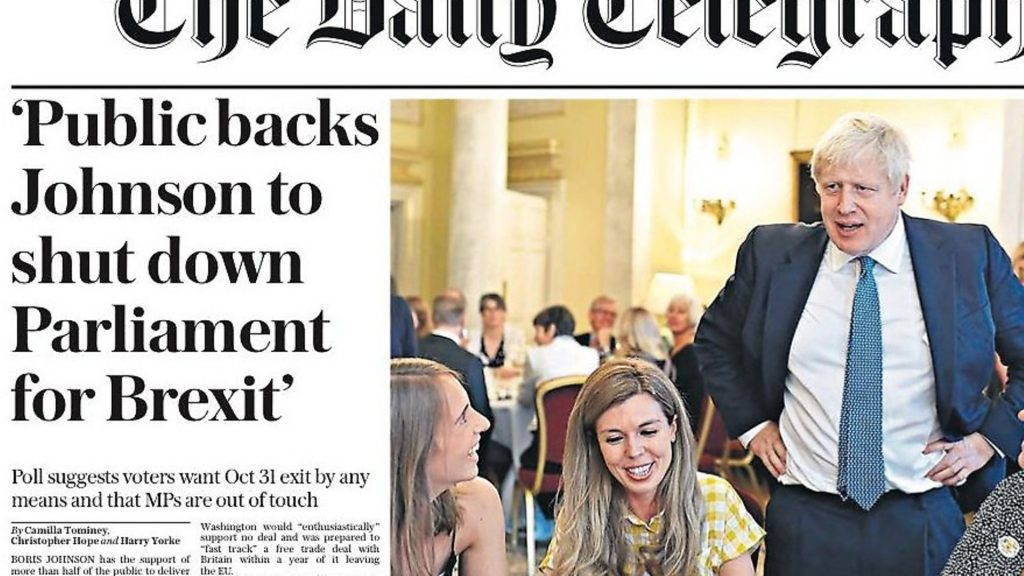
Former YouGov president PETER KELLNER on the Telegraph’s questionable poll surrounding a no-deal Brexit, and how the public should have been asked to express a view.

Seldom does life so precisely resemble art. Today’s Daily Telegraph front page headline proclaims: “Public backs Johnson to shut down parliament for Brexit”. Its lead story begins: “Boris Johnson has the support of more than half the public to deliver Brexit by any means, including suspending Parliament, a poll has suggested”.
In fact, this finding comes straight from the Sir Humphrey Appleby playbook on how to rig a poll. In one episode of Yes Prime Minister, he explains to his sidekick how to show the public want to reintroduce national service. His proposed questionnaire starts by asking about the lack of discipline among many teenagers, then asks whether young people might welcome more structure and leadership in their lives and whether they might rise to a challenge. Only then does he ask: “Might you be in favour of reintroducing national service?”
Alternatively, Sir Humphrey suggests, you could obtain the opposite result by asking about the danger of war, the growth of armaments and the dangers of teaching teenagers how to use a gun, and then: “Would you oppose the reintroduction of national service?”
Now compare this with the ComRes poll in today’s Telegraph. I’m definitely not saying the poll was deliberately rigged: I have no evidence of motives. But had someone asked me how to ensure a pro-suspending-parliament outcome, this is pretty well what I would have proposed.
The three preceding questions to the one in the headline consisted of statements; people were asked in each case whether they agreed with it or disagreed.
“Parliament is out of touch with the British public” (Agree 77%, Disagree 11%, don’t know 12%)
“On Brexit, most MPs seem to ignore the wishes of voters and push their own agendas” (78%, 9%, 12%)
“The Queen should remain above politics and refuse to get involved in Brexit” (62%, 19%, 19%)
And only then:
“Boris needs to deliver Brexit by any means, including suspending parliament if necessary, in order to prevent MPs stopping it (44%, 37%, 19%)
This is the basis for the Telegraph informing us that “more than half the public” back driving Brexit through regardless.
For a start, 44% is plainly NOT “more than half the public”. You only push the number above 50% by ignoring the don’t knows. There are occasions when this is justified – for example when asking voting intentions ahead of an election or referendum. It should not generally be done with questions about public attitudes to issues – and when it is done, the removal of “don’t knows” should be stated clearly and prominently.
The larger point about this poll is that the three preceding statements all tee up something that pollsters have known for years: that when you ask questions about politicians and parliament in isolation of other issues and other elite groups, voters are liable to display scepticism. Something else that pollsters know is that people don’t like to contradict themselves too obviously. This is why good polls take great care about what questions are asked and in what order – so as to minimise the danger of conditioning respondents.
Moreover, the statement that generated the Telegraph headline combines two distinct issues: Brexit itself, and getting the whole saga resolved soon. Again, any competent pollster will tell you that voters are getting bored with Brexit and would like get it resolved soon one way or the other.
So, having just said that they think parliament is out of touch, and that MPs “ignore the wishes of voters”, we should not be surprised that many of them warm to the idea of suspending parliament and escaping the Brexit quagmire as soon as possible. Indeed, to me the only surprise is that, in this polling context, the figure is as low as 44%.
Later on in the same ComRes poll, respondents were asked whether they were concerned or not concerned about eight possible consequences of the UK leaving the UK without a deal. In three instances, and despite their “Brexit by any means” answer a few minutes earlier, genuine majorities (that is, everyone including “don’t knows”) expressed concern: cost of living increases (concerned 68%, not concerned 24%, don’t know 8%), supplies of medicines (59%, 32%, 10%) and supplies of fresh food (53%, 40%, 8%).
Now, had THOSE questions been asked first, followed immediately by a more neutrally-worded question about a no-deal Brexit, I suspect the Telegraph would not have the headline or story it wanted.
Actually, that’s more than a suspicion. Two weeks ago, another poll asked people how they would feel if the UK leaves the EU without a deal. Just 28% said they would be “pleased”, while 49% said “betrayed”; 23% were don’t knows. The pollster that time? Funny you should ask. It was ComRes.
– Peter Kellner is former president of YouGov
Warning: Illegal string offset 'link_id' in /mnt/storage/stage/www/wp-includes/bookmark.php on line 357
Notice: Trying to get property 'link_id' of non-object in /mnt/storage/stage/www/wp-includes/bookmark.php on line 37






